- Home
- Andrew Wareham
Long Way Place (Cannibal Country Trilogy, Book 1)
Long Way Place (Cannibal Country Trilogy, Book 1) Read online
Andrew Wareham
BOOK ONE
Cannibal Country Trilogy
Digital edition published in 2015 by
The Electronic Book Company
A New York Times Best-seller
Listed Publisher
www.theelectronicbookcompany.com
www.facebook.com/quality.ebooks
This ebook is licensed for your personal enjoyment only. This ebook may not be re-sold or given away to other people. If you would like to share this ebook with another person, please purchase an additional copy for each recipient. If you’re reading this ebook and did not purchase it, or it was not purchased for your use only, then please purchase your own copy. Thank you for respecting the hard work of this author. This ebook contains detailed research material, combined with the author's own subjective opinions, which are open to debate. Any offence caused to persons either living or dead is purely unintentional. Factual references may include or present the author's own interpretation, based on research and study.
Long Way Place
Copyright © 2015 by Andrew Wareham
All Rights Reserved
Contents:
Title Page
Copyright Page
Introduction
Chapter One
Chapter Two
Chapter Three
Chapter Four
Chapter Five
Chapter Six
Chapter Seven
Chapter Eight
Chapter Nine
Chapter Ten
By the Same Author
Introduction
The harsh life in an English port city forces gutter rat, Ned Hawkins to make a living any way he can, until he gets a break with a job on a country estate. But an entanglement with the owners’ daughter means he has to take flight, and the sea becomes his only viable option.
Working on a steamship, Ned graduates from stoker to engineer and opportunities open up for him in Australia and the plantations of Papua - a dangerous land where cannibalism and cannibals are never far away.
The outbreak of WWI takes Ned to the German Colony of New Guinea, where he secures a policing role with the new administration. After a huge misunderstanding he is coerced into marriage with Jutta, the beautiful daughter of a German settler. Despite the peculiar circumstances of their marriage, love soon develops. However, ominous events are also developing that threaten their newly-found contentment…
Author’s Note: I have written and punctuated Long Way Place in a style reflecting English usage in novels of the era, when typically, sentences were longer than they are in modern English. Editor’s Note: Andrew’s book was written, produced and edited in the UK where some of the spellings and word usage vary slightly from U.S. English.
'You can take the man
out of the slum...'
LONG WAY PLACE
Chapter One
The little shunting engine crawled round the bend by the gasometers. It slowed for the points that allowed it to cross the main line from Southampton New Docks station, the Boat Train terminus, and pass into the Old Docks on the River Itchen side, near Northam. A string of closed trucks, all with the War Department broad arrow on them, munitions bound for the war in South Africa, clattered and battered against each other, lost in the dark.
Steam curled up, obscuring the engine driver’s view behind him, as it always did just here. The saddle tanks helped as well, blocking out the ground immediately behind the engine. The guard in the brake van was out of sight, round the curve. Just at this point none of the crew could see the middle and front of their train and the only risk was of a foot patrol. The docks coppers almost never came round here, a quarter of a mile away from the nearest warehouse and outside the actual docks wall.
Edward Albert Hawkins ran out from the cover of the big buddleia bush, bare of flower at this time of year. He crossed two sets of rails, almost invisible in a dark jacket buttoned up to the neck, and swung his scrawny body up onto the buffers between two of the front trucks. He crouched into the shadows, covering his pale face and fairish hair in a piece of sacking for the transit through the lights at the gates. He had never been spotted doing this. The Docks Police weren't real coppers and they were always at least half asleep at two o’clock in the morning and he was barely five feet tall anyway. Ten minutes and he was inside the walls.
As the train slowed he hopped off into the shadows of a warehouse – the lights were few and far between on the tracks leading in. The loading bays themselves had rows of gas lights and a few of the big new electric arcs, but the back was black.
He knew exactly where he was. He made this trip at least twice every week, had been doing so for five years, ever since he was nine and just big and strong enough to get up on the buffers in the two minutes of opportunity. He knew of one lad who had slipped, gone under the wheels at the age of eight, had preferred to wait till he was a little bigger and keep both legs. The rule he had made for himself was to get off at the first opportunity and then to enter the nearest warehouse or store. Speed was everything, and wandering about on foot, looking for the best place, was a recipe for trouble. There were more foot patrols to bump into in this part of the docks, even if the coppers were blind as bats and wouldn’t go hunting for anything likely to make work for them. The least you would get if you were caught was a solid thump round the ear; the worst was reform school. If you were under twelve then you could get four years free ‘education’ from the warders, and sit sorely for all of them. If you were old enough to go to clink you only got six months of honest prison for a first offence – kids always got the worst of it.
He was hungry, had eaten nothing all day. There had been enough food in the house for his little twin sisters to have a breakfast and a tea of bread and dripping when they got home. They got a hot midday meal at school, for free, some charity brought it in – but there had not been anything for him besides a cup of cocoa, without milk or sugar, the girls had finished the last of that. He’d had bad luck earlier in the week, had only made a couple of shillings on the night, needed to do better tonight or he would have to risk going in a third time.
Their mum had been on the game, still making a good living for the family, she was less than thirty and not worn out yet, but they had not seen her in six months. The word was that she had gone with a group of half a dozen sailors, all of them drunk, her as well. Ned was sure she was in the river – caught dipping their pockets or one of them simply too rough and strangling her and hiding the evidence. Whatever, she was gone and the girls were his responsibility now.
There was a vertical iron fire-ladder behind him, dirty and rusty. He ran up it, almost to the roof, nearly thirty feet above ground, swung across to a narrow window, just big enough for him to slip through, held on one-handed while he heaved at the sash he had left unlocked a month before. The frame moved easily, there had been no check; the watchman had not stirred himself above ground level. The piece of rope he had stolen and stuffed between two of the roof beams should still be there as well. Had the window been locked he would have gone back down the ladder immediately – he would not take the risk of forcing it and the off chance that they might be waiting for him.
Once inside, on the third floor of the warehouse, he eased his way towards the weak light at the front, the reflection from the bay on the ground floor. He needed to check that the place was empty upstairs. Satisfied that all was clear, he began to read the labels on the cardboard boxes and wooden chests stacked in the bays, scurrying rapidly and silently along the aisles. Tea, rice in big sacks, indigo, whatever that was; no use to him, this was all off of a boat in from India. He shif
ted to another bay, hit lucky at once – corned beef from the Argentine, down in South America, that was. The cases weighed a half-hundredweight, eight seven-pound tins to each, heavy, but not too much so. He lifted a carton down from the middle shelf and hauled another forward so as to leave no obvious gap in the line, then walked silently to the window. He had stolen a pair of rubber-soled boots, a size too big for him, six months before and they fitted him like gloves now, were perfect for his line of business. He felt for the rope, tucked away against future need, tied it round the case and lowered his booty noiselessly to the ground, dropping the rope on top. A minute and he was down, window shut behind him, rope pushed behind some brambles, hopefully there again next week. It was raining heavily now, winter cold and ideal for his needs, the patrols would be having a quick smoke in cover – they wouldn’t be out in this. He crossed the tracks and sat down and waited for a useful train. Eventually one would stop for a minute or two, held up inside while an express went through on the main line.
An hour passed and his train came, stopped exactly where he wanted it. He heaved the case onto the buffers, hurriedly jumped up after it. Three years before he had swung a box up and then watched it disappear into the night, lost forever as the train pulled away. A nuisance that it was a coal train, household fuel off one of the Newcastle boats and going up to Eastleigh or Winchester for the fires there. He would be dirty to the bone by the time he got off at St Mary’s, but he had to take what came – that was what life was about, after all.
Twenty minutes later he picked up the now slightly battered carton, slung it on his shoulder and walked half a mile through the back streets to the pair of rooms in Bevois Valley where he and his sisters lived. There was no adult but he paid the rent each week and the landlord asked no questions, would probably say nothing when he evicted them on the day he failed to pay up.
He washed in cold water, changed into his other set of clothes, brushed his working jacket and trousers off in the back yard and then put his shirt and flannel underclothes to soak – he had no socks.
Three of the tins went into the cupboard that served as a larder – a pound of corned beef a day each for the rest of the month. They could fry it with spuds in a hash, or boil it in a stew, as well as eat it on bread and margarine. A meat diet would put a bit of flesh on the girls’ bones with winter coming in. He waited till six o’clock then put his boots back on and walked the hundred yards to the corner shop where he passed four tins across, received a half crown in cash which he immediately handed back. They were agents for the landlord, collected most of the rents in the street. As well, he was given a big tin of South African apricot jam and two pounds of margarine, a loaf of bread and a can of milk and two pounds of sugar and half a stone of spuds and a bottle of paraffin for their heater and cooker. Old Mrs Matthews who ran the shop was a decent enough old biddy, she threw in a bag of broken biscuits for free, a treat for the girls.
They were fed for rest of the week, anything else he laid his hands on now would be a bonus. But the girls were growing fast, ten years old, coming on eleven, and they would need a warm woolly each for winter, a heavy coat as well, new shoes and thick stockings. Buying second-hand from the stalls at Kingsland Market he would need at least five shillings apiece, and to get that he would have to risk extra runs into the docks. Twice a week was safe enough, but if he started going every night he would run into a waiting copper very quickly, and then he would go down and the girls would be on their own.
There was no work for a gutter rat, never could be in the nature of things. He had no trade because he had no father to teach him one and no money to buy an apprenticeship. He could not read and write well enough to get by in an office, even if he could find one to take him. He did not have the clothes to do shop work. The only job he could get would be as a stoker, in the black gang. Steam ships always needed coal-pushers, but that would take him away for six months at a time, and what would the girls do while he was away?
He grunted sourly – he knew exactly what would happen to the girls within the day of him leaving. They were quite pretty and bright, would be grabbed by that bastard Dave who was hard man for the Old Bitch and marched along to Mrs Pink’s house, like it or not. Dave had already offered ten pounds in his hand if he would walk them up the road to her. She specialised in offering ‘entertainment to more discerning gentlemen’, had passed the word to him that the girls would be well fed and warm and would soon get used to doing tricks for the paying customers, it was only a little thing, when all was said and done. If he went away, to prison or to work, the girls would not have a chance. He wasn’t sure he could protect them himself, was certain that they could not live unmolested on their own.
Back at home he made the cocoa, well sugared and with milk, cut generous slabs of bread and jam for breakfast and got the girls up for school, chasing them out from under the mound of blankets and old coats on the horse-hair mattress they shared. He walked them up the road, taking the last tin with him, saw them in the school gates then turned off into another terrace, almost identical to the one where he lived. A hundred or more in the row, all two up, two down, this one subdivided into four, front door opening onto the pavement, such as it was. He knocked and opened a downstairs door.
“Hello, Lizzie, how you feeling today?”
He put the meat tin down on the table as a girl, older than him, stirred stiffly out of bed. She was a friend of his childhood, had known his mother. She had run away from her step-father’s attentions a couple of years previously, had inevitably gone on the game, able to earn a good living while she was young and fresh. She had made a mistake the week before, taken on a mark who had offered a sovereign for ‘something a bit special’. The weals from the bamboo cane were healing quite well but she was still unwilling to go back to work.
She disappeared outside, came back a few minutes later, dropping the dressing-gown that was all she wore.
“You be gentle, now, Ned Hawkins!” she warned him.
In mid-morning she stirred him out of sleep, sent him off to his own bed.
“You better not come back no more, Ned. I talked to Billy Richards last night, Ned. I’m going to his house next week – I’ll be safe there. I can’t do it on me own no more, Ned – I’m scared.”
She had already asked Ned to be her minder, had promised to find two or three other girls to work for him too. He could have pocketed two pounds a week steady from a stable of four girls, could have saved a few quid and set up his own house within a year or two – but poncing was low, and he had too much pride for that. One day he was going to get out of the gutter, now he would not wallow in it.
He shrugged, said goodbye and walked away – that was life.
He wasn’t sleepy so he wandered into town, just to have a look about, see if he could pick anything up, there might be something going.
He walked to the Bar Gate, saw nothing of interest, the stores all too well guarded by their counter jumpers, passed by an office, a shop converted by one of the charities by the looks of it. He stopped for a glance in - The Salvation Army was always good for a hot cup of tea at least. There was a notice in the window, 'Canada' written in red letters. It was an orphans’ society, one that sent girls out to be servants in Canada. That was in America, he thought, across the sea anyway. They would go to ‘selected and supervised’ farms where they could often eventually find a husband and a good life in the countryside. It was a land of opportunity, he read – the girls would be clothed, fed, paid a wage and protected from ‘harm’ by the Society and would be encouraged to live respectable lives.
The door was open and he could see a big, hatchet-faced old bat hanging her coat up. She was twice Ned’s size and he reckoned she would be able to protect anybody against perils of any sort. He grinned and ambled on, was fifty yards up the road before the idea struck him. He could offer the twins no future, very little hope. He could not get them out of the slum, but this Society could, maybe. It was worth talking to them; anyway, he had not
hing to lose.
The door was still open and he walked uncertainly inside, took his hat off to the big lady.
“Well, young man? This is a Society for Female Orphans, you know, we can’t send you to Canada!”
“I knows that, ma’am – I read the notice. I got two young sisters, lady, twins, and mum’s dead, I reckon, ain’t seen her this year, and I never knew who their dad was. Nor did she, I reckons. I look after them as best I can, ma’am, but I can’t do it, not and keep ‘em safe for sure. I could go to the coppers, I suppose, and then they’d be took away and put in a Home, and anything could happen to ‘em, and that ain’t right. I don’t know if I can keep ‘em warm even, this winter.”
“How old are they?”
“Nearly eleven, ma’am.”
“Too young, we never take girls under the age of twelve, prefer them to be fourteen. I am sorry, young man – in two years time we will be able to help you, but not now.”
“They’ll be in a house by then, lady. One of these days I’ll turn me back at the wrong time and some bastard’ll belt me over the ‘ead and take them away. Or he’ll tell the girls as ‘ow they’re a burden on me and ‘ow they could make their own way without making my life a misery. They’re good girls, be easy to take advantage of ‘em that way.”
She was silent a moment, trying to accept just what he was saying. Her first reaction was to reject it out of hand; it was too much out of her world, her experience.
“They are eleven years old, young man, they are only little girls, children.”
“I been offered ten pounds for ‘em already, lady. There’s two places in town I knows of what keeps girls from six or seven year old and sends ‘em away as soon as they’re twelve or so, when they start to grow up.”

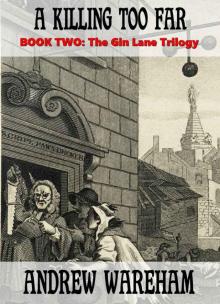 A Killing Too Far
A Killing Too Far Killing's Reward
Killing's Reward A New Place
A New Place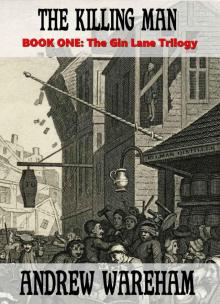 The Killing Man
The Killing Man Bold and Blooded
Bold and Blooded The Breaking Storm (Innocent No More Series, Book 2)
The Breaking Storm (Innocent No More Series, Book 2) Nobody’s Child
Nobody’s Child 04 Peking Nightmares (The Earl’s Other Son Series, #4)
04 Peking Nightmares (The Earl’s Other Son Series, #4) Red Man
Red Man Foreign Mud
Foreign Mud The Gathering Clouds (Innocent No More Series, Book 1)
The Gathering Clouds (Innocent No More Series, Book 1) 06 A Soldier’s Farewell (Man of Conflict #6)
06 A Soldier’s Farewell (Man of Conflict #6) Chinese Whispers
Chinese Whispers 02 Shanghai Dreams (The Earl’s Other Son #2)
02 Shanghai Dreams (The Earl’s Other Son #2)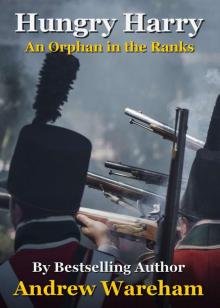 Hungry Harry: An Orphan in the Ranks
Hungry Harry: An Orphan in the Ranks A Wretched Victory (Innocents At War Series, Book 6)
A Wretched Victory (Innocents At War Series, Book 6) Illusions Of Change (A Poor Man at the Gate Series Book 6)
Illusions Of Change (A Poor Man at the Gate Series Book 6) The Wages Of Virtue (A Poor Man at the Gate Series, Book 8)
The Wages Of Virtue (A Poor Man at the Gate Series, Book 8) Blood and Famine (Man of Conflict Series, Book 4)
Blood and Famine (Man of Conflict Series, Book 4) The Friendly Sea (The Duty and Destiny Series, Book 1)
The Friendly Sea (The Duty and Destiny Series, Book 1) Bursting Balloons (Innocents At War Series, Book 5)
Bursting Balloons (Innocents At War Series, Book 5)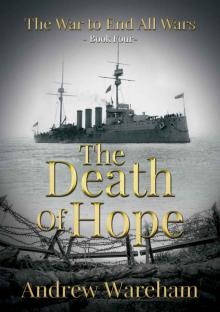 The Death of Hope
The Death of Hope Deadly Shores (The Duty and Destiny Series, Book 11)
Deadly Shores (The Duty and Destiny Series, Book 11) The Vice Of Virtue (A Poor Man At The Gate Series Book 10)
The Vice Of Virtue (A Poor Man At The Gate Series Book 10) Virtue’s Reward (A Poor Man at the Gate Series, Book 11)
Virtue’s Reward (A Poor Man at the Gate Series, Book 11) A Deadly Caper (Innocents At War Series, Book 2)
A Deadly Caper (Innocents At War Series, Book 2)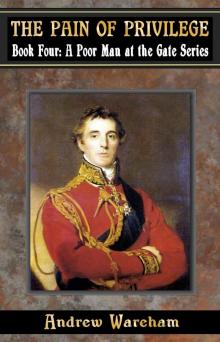 The Pain Of Privilege (A Poor Man at the Gate Series Book 4)
The Pain Of Privilege (A Poor Man at the Gate Series Book 4) Far Foreign (The Duty and Destiny Series, Book 9)
Far Foreign (The Duty and Destiny Series, Book 9) Shores of Barbary (The Duty and Destiny Series, Book 12)
Shores of Barbary (The Duty and Destiny Series, Book 12)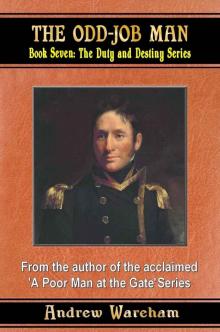 The Odd-Job Man (The Duty and Destiny Series, Book 7)
The Odd-Job Man (The Duty and Destiny Series, Book 7) Fire and Folly (Man of Conflict Series Book 3)
Fire and Folly (Man of Conflict Series Book 3) A Victorian Gent (The Making of a Man Series, Book 1)
A Victorian Gent (The Making of a Man Series, Book 1) Sugar and Spice (The Duty and Destiny Series, Book 6)
Sugar and Spice (The Duty and Destiny Series, Book 6) Dark Days Of Summer (Innocents At War Series, Book 4)
Dark Days Of Summer (Innocents At War Series, Book 4) Dire Shenanigans (The Making of a Man Series, Book 2)
Dire Shenanigans (The Making of a Man Series, Book 2) The Fuzzy-Wuzzy Man (The Duty and Destiny Series, Book 3)
The Fuzzy-Wuzzy Man (The Duty and Destiny Series, Book 3) Privilege Preserved (A Poor Man at the Gate Series Book 5)
Privilege Preserved (A Poor Man at the Gate Series Book 5) No Longer A Game (Innocents At War Series, Book 3)
No Longer A Game (Innocents At War Series, Book 3) An Uncertain Peace (The Making of a Man Series, Book 3)
An Uncertain Peace (The Making of a Man Series, Book 3) Fortune And Glory (The Duty and Destiny Series, Book 5)
Fortune And Glory (The Duty and Destiny Series, Book 5) The Old Order (A Poor Man at the Gate Series Book 7)
The Old Order (A Poor Man at the Gate Series Book 7) A Place Called Home (Cannibal Country Trilogy, Book 2)
A Place Called Home (Cannibal Country Trilogy, Book 2) Nouveau Riche (A Poor Man at the Gate Series, Book 2)
Nouveau Riche (A Poor Man at the Gate Series, Book 2) The Privateersman (A Poor Man at the Gate Series Book 1)
The Privateersman (A Poor Man at the Gate Series Book 1) Britannia’s Son (The Duty and Destiny Series, Book 4)
Britannia’s Son (The Duty and Destiny Series, Book 4) Long Way Place (Cannibal Country Trilogy, Book 1)
Long Way Place (Cannibal Country Trilogy, Book 1) Spanish Tricks (Man of Conflict Series, Book 5)
Spanish Tricks (Man of Conflict Series, Book 5) A Parade Of Virtue (A Poor Man At The Gate Series Book 9)
A Parade Of Virtue (A Poor Man At The Gate Series Book 9) A Busy Season (The Duty and Destiny Series, Book 8)
A Busy Season (The Duty and Destiny Series, Book 8) Billy Bacon and the Soldier Slaves (Colonial Warrior Series, Book 1)
Billy Bacon and the Soldier Slaves (Colonial Warrior Series, Book 1) Raging Rajahs (Man of Conflict Series, Book 2)
Raging Rajahs (Man of Conflict Series, Book 2) Victorian Dawn (A Poor Man at the Gate Series, Book 12)
Victorian Dawn (A Poor Man at the Gate Series, Book 12) Born To Privilege (A Poor Man at the Gate Series Book 3)
Born To Privilege (A Poor Man at the Gate Series Book 3) The Soldier Brat (Man of Conflict Series, Book 1)
The Soldier Brat (Man of Conflict Series, Book 1)